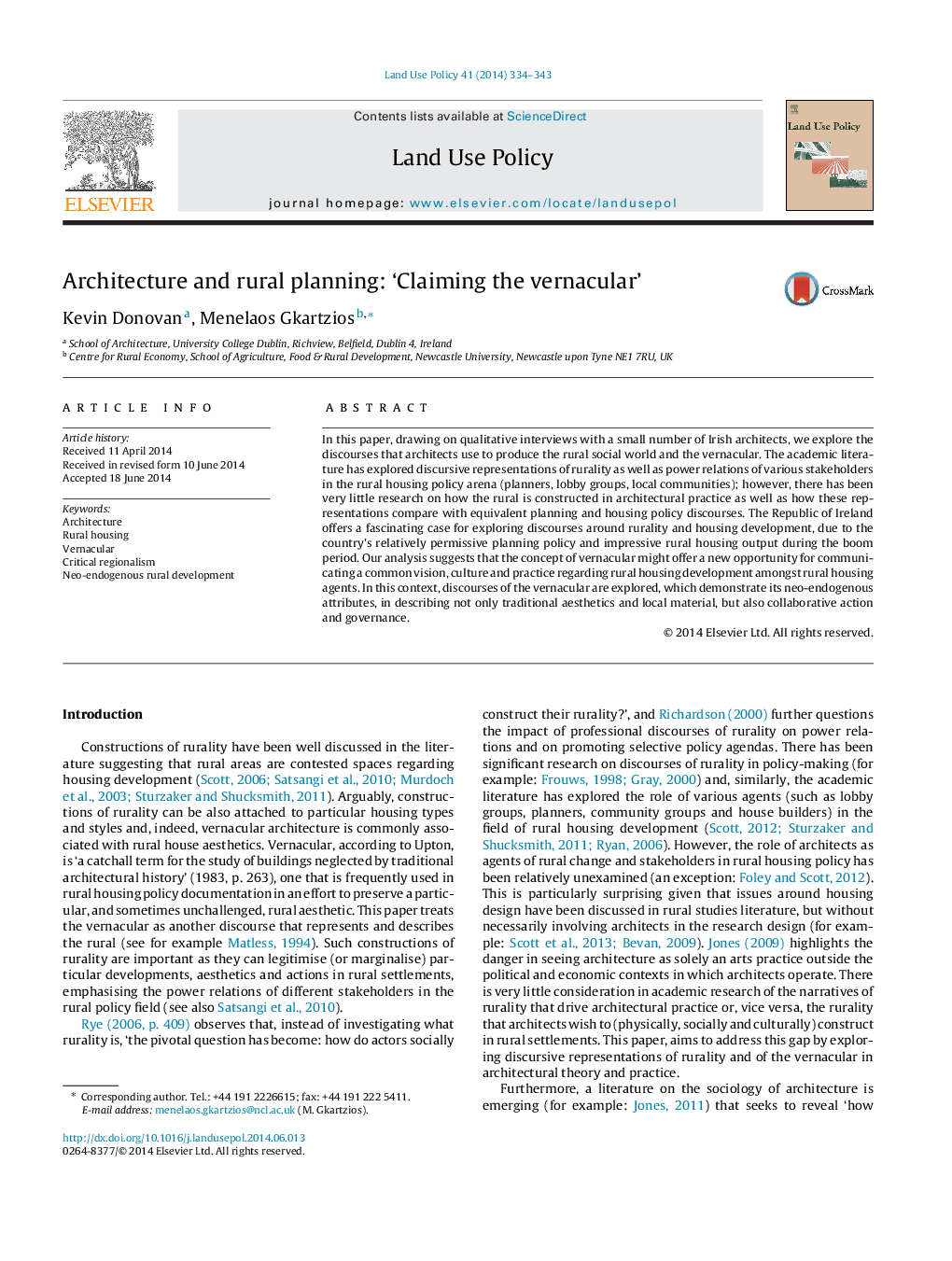| کد مقاله | کد نشریه | سال انتشار | مقاله انگلیسی | نسخه تمام متن |
|---|---|---|---|---|
| 6548547 | 160104 | 2014 | 10 صفحه PDF | دانلود رایگان |
عنوان انگلیسی مقاله ISI
Architecture and rural planning: 'Claiming the vernacular'
ترجمه فارسی عنوان
معماری و برنامه ریزی روستایی: "ادعای بومی"
دانلود مقاله + سفارش ترجمه
دانلود مقاله ISI انگلیسی
رایگان برای ایرانیان
کلمات کلیدی
معماری، مسکن روستایی، بومی منطقه ای انتقادی، توسعه روستایی غیرقانونی،
ترجمه چکیده
در این مقاله، با استفاده از مصاحبه های کیفی با تعدادی از معماران ایرلندی، ما بحث هایی را که معماران برای تولید دنیای اجتماعی روستایی و بومی ها استفاده می کنند، کشف می کنیم. ادبیات آکادمیک بازنمودهای گفتمانی روستایی و همچنین روابط قدرت ذینفعان مختلف در عرصه سیاست مسکن روستایی (برنامه ریزان، گروه های لابی، جوامع محلی) را بررسی کرده است. با این حال، تحقیقات بسیار کمی در مورد چگونگی ساخت روستا در عمل معماری و نحوه نمایش این مقایسه ها با گفتمان های برنامه ریزی مساوی و مسکن صورت گرفته است. جمهوری ایرلند با توجه به سیاست های برنامه ریزی نسبتا قابل قبول کشور و خروج موثر از مسکن روستایی در طول دوره رونق، یک مورد جذاب برای بررسی گفتمان ها در مورد روستا و توسعه مسکن است. تجزیه و تحلیل ما نشان می دهد که مفهوم بومی ممکن است یک فرصت جدید برای برقراری یک دید کلی، فرهنگ و عمل در مورد توسعه مسکن روستایی در میان عوامل مسکن روستایی ارائه دهد. در این زمینه، گفتمان های زبان بومی، که ویژگی های نئو-اندوژن خود را نشان می دهند، در توصیف نه تنها زیبایی های سنتی و مواد محلی، بلکه همکاری و حکمرانی نیز مورد بررسی قرار می گیرند.
موضوعات مرتبط
علوم زیستی و بیوفناوری
علوم کشاورزی و بیولوژیک
جنگلداری
چکیده انگلیسی
In this paper, drawing on qualitative interviews with a small number of Irish architects, we explore the discourses that architects use to produce the rural social world and the vernacular. The academic literature has explored discursive representations of rurality as well as power relations of various stakeholders in the rural housing policy arena (planners, lobby groups, local communities); however, there has been very little research on how the rural is constructed in architectural practice as well as how these representations compare with equivalent planning and housing policy discourses. The Republic of Ireland offers a fascinating case for exploring discourses around rurality and housing development, due to the country's relatively permissive planning policy and impressive rural housing output during the boom period. Our analysis suggests that the concept of vernacular might offer a new opportunity for communicating a common vision, culture and practice regarding rural housing development amongst rural housing agents. In this context, discourses of the vernacular are explored, which demonstrate its neo-endogenous attributes, in describing not only traditional aesthetics and local material, but also collaborative action and governance.
ناشر
Database: Elsevier - ScienceDirect (ساینس دایرکت)
Journal: Land Use Policy - Volume 41, November 2014, Pages 334-343
Journal: Land Use Policy - Volume 41, November 2014, Pages 334-343
نویسندگان
Kevin Donovan, Menelaos Gkartzios,
